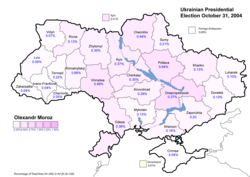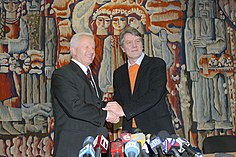

This biography of a living person needs additional citations for verification. Please help by adding reliable sources. Contentious material about living persons that is unsourced or poorly sourced must be removed immediately from the article and its talk page, especially if potentially libelous.
Find sources: "Oleksandr Moroz" – news · newspapers · books · scholar · JSTOR (February 2008) (Learn how and when to remove this message) |
Oleksandr Moroz
| |
|---|---|
Олександр Мороз
| |

Moroz in 2003
| |
| Chairman of the Verkhovna Rada | |
| In office 6 July 2006[1] – 4 December 2007 | |
| Preceded by | Volodymyr Lytvyn |
| Succeeded by | Arseniy Yatsenyuk |
| In office 18 May 1994[2] – 7 July 1998 | |
| Preceded by | Ivan Plyushch |
| Succeeded by | Oleksandr Tkachenko |
| People's Deputy of Ukraine | |
| In office 15 May 1990 – 23 November 2007 | |
| Constituency | Communist Party of Ukraine, Kyiv Oblast, District No.224 (1990–1994)[3] Socialist Party of Ukraine, Kyiv Oblast, No.223 (1994–1998)[4] Socialist Party of Ukraine, Kyiv Oblast, No.92 (1998–2002)[5] Socialist Party of Ukraine, No.1 (2002–2007)[6] |
| Personal details | |
| Born | (1944-02-29) 29 February 1944 (age 80) Buda, Ukrainian SSR, Soviet Union (now Ukraine) |
| Political party | Socialist Party of Ukraine (1991–2022)[a] |
| Other political affiliations | Communist Party of Ukraine (1972–1991) |
| Spouse | Valentyna Andriyivna (née Lavrynenko)[8] |
| Children | Iryna (1966) Ruslana (1972) |
| Signature |  |
| Website | http://www.spu.in.ua/leader.php |
| |
Oleksandr Oleksandrovych Moroz[b] (born 29 February 1944) is a Ukrainian politician. He was the Chairman of the Verkhovna Rada twice, from 1994 to 1998 and again from 2006 to 2007. Moroz is one of the founders and the leader of the Socialist Party of Ukraine, formerly an influential political party in Ukraine. Moroz lost parliamentary representation when the Socialist Party failed to secure sufficient number of votes (2.86%) in the 2007 snap parliamentary election, falling 0.14% short of the 3% election threshold.
Oleksandr Oleksandrovych Moroz was born on 29 February 1944 in the village of Buda [uk], in what was then the Ukrainian Soviet Socialist Republic of the Soviet Union. After graduating from the local school in 1960, Moroz graduated from the Agricultural Academy of the Ukrainian SSR to become a mechanical engineer. He then worked in many careers, including as a teacher and engineer for twelve years. Moroz joined the Communist Party of the Soviet Union, moving from the First Secretary of local Regional Committee of the Communist Party to the position of the Head of the Kyiv Oblast Committee and the Oblast Trade Union Committee. He was a recipient of the Medal "For Labour Valour". He was a member of the Communist Party of the Soviet Union from 1972 to 1991.
Moroz became a deputy of the Verkhovna Rada in 1990. During the August 1991 Declaration of Independence of Ukraine, Moroz was the leader of the Communist Party in the Verkhovna Rada.[9] On 26 October 1991, he arranged the congress that formed the Socialist Party of Ukraine (SPU) as a successor of the Soviet-era Communist Party of Ukraine.
Moroz ran as a presidential candidate as a nominee of the Socialist Party of Ukraine in the 1994 and 1999 presidential elections, but he came third both times, with 13.04% of the vote in 1994 and 11.29% in 1999. In 1999, many experts predicted that Moroz had a chance to defeat incumbent Leonid Kuchma in the election run-off and according to many observers the government rigged the election results[10] in favour of Petro Symonenko (of the Communist Party of Ukraine) in order to make sure that unpopular Symonenko, rather than Moroz, would compete against Kuchma in the run-off vote.
In 1996, Moroz together with several other parties prevented President Kuchma's attempt to concentrate most of the powers in the President's hands and led the Verkhovna Rada to adopt on 28 June the new Constitution that includes many positions close to the demands of left-wing parties. After signing the treaty of "Kanev Four" in 1999, he became an acknowledged leader of the non-Communist opposition to Kuchma.
At a 2001 sitting of the Verkhovna Rada, Moroz made public Mykola Melnychenko’s tapes that alleged the involvement of the leaders of Ukraine, including Kuchma, in the murder of famous independent journalist Georgiy Gongadze that provoked the political crisis in Ukraine known as the Cassette Scandal. Moroz was a member of a special board "Forum of national salvation", a representative of a Public Committee of Protection of the Constitution "Ukraine without Kuchma" and later "Rise, Ukraine!" in charge of negotiations with representatives of the regime.
Following the 2002 parliamentary election, the Socialist Party (which included Yuriy Lutsenko, Josef Vinski, Mykola Rudkovski and Valentyna Semenyuk) was the fourth-largest party in the Verkhovna Rada. The Socialists joined the "Oppositional Four", a group of parties that also included Our Ukraine, Yulia Tymoshenko Electoral Bloc and the Communist Party of Ukraine.

In the 2004 presidential election, Moroz was nominated by the Socialist Party which he has chaired since 1991. He won third place with 5.81% of the vote. As a long-time leader of anti-Kuchma forces, Moroz quickly announced his support for Viktor Yushchenko's presidential bid against Kuchma's Prime Minister Viktor Yanukovych, thus making Yushchenko the favourite to win in round two. That Yushchenko did not win despite this endorsement was used to argue that there was election fraud in the run-off.

Moroz supported the subsequent Orange Revolution, the mass protests that eventually led to the annulment of the vote results and to a revote won by Yushchenko. The support of the Socialist Party he brought to Yushchenko's campaign was important to widen Yushchenko's appeal to voters.[citation needed] Similarly, the votes of Moroz's Socialist Party faction in the Verkhovna Rada were crucial for passing several important resolutions during the Orange Revolution, particularly the non-confidence vote in the Kuchma–Yanukovych government involved in election fraud scandal.
After the 2006 parliamentary election, Moroz was elected the Chairman of the Verkhovna Rada of Ukraine on 6 July 2006 (238 ayes, 226 needed for election) with support of the Party of Regions, the Socialist Party and Communist factions. The Socialist Party of Ukraine received 2.86% of the national vote in the 2007 parliamentary election, falling 0.14% below the election threshold, denying them the right of representation and removing Moroz as a member of the Verkhovna Rada.
The Socialist Party chose the party leader Oleksandr Moroz as their presidential candidate for the 2010 presidential election, whose first-round ballot was scheduled to be held on 17 January 2010. 268 out of 422 party congress delegates registered supported Moroz's nomination.[11] During the election, Moroz received 0,38% of the votes.[12] Public opinion polls did not rate the Socialist Party or its leader Moroz as they were undecided as to their participation in the presidential election. In 2005, Moroz received 5.8% of the national vote. An opinion polls conducted by FOM-Ukraine in April 2009 showed Moroz with less than 1% support, with most analysts not considering Moroz as a serious contender as he would not win sufficient number of votes in the first-round presidential ballot, scheduled for 17 January 2010.
After leading his party for twenty years, Moroz was succeeded as party leader by Vasyl Tsushko in July 2010.[13] However, he was again elected as party leader in August 2011.[14] In April 2012, Petro Ustenko was elected as Moroz's successor as party leader.[15]
Moroz tried to return to the Verkhovna Rada in the 2012 parliamentary election, running as an independent candidate for single-member district number 93 (first-past-the-post winning a seat) located in Kyiv Oblast. Moroz was unsuccessful, finishing in third with 11.94% of the vote.[16]
In the 2019 Ukrainian presidential election, Moroz was a candidate for the Socialist Party of Oleksandr Moroz.[17]
Since organising the left-leaning Socialist Party of Ukraine, his party ideology largely evolved from orthodox Communism (Marxism–Leninism) to social democracy. He himself is a left-wing social democrat, although he has used both Marxist and social democratic rhetoric. For his moderate ideals, he met strong opposition from the more conservative wing of his party, represented by the supporters of Nataliya Vitrenko. Vitrenko eventually left the Socialist Party, proclaimed the Progressive Socialist Party of Ukraine, and branded Moroz as an "opportunist" and "traitor", helping Kuchma to fight the opposition of Ukraine, which included the Socialist Party. After the last radicals headed by Ivan Chyzh left the party and formed an organization called Spravedlyvist (Justness), Moroz was able to transform his party closer to the European social democratic model.
Moroz and his party supported the political reform and Ukraine's transition towards a more European parliamentary democracy which shifted the power balance in Ukraine stripping the President of some of his powers in favour of the Verkhovna Rada. During the Orange Revolution, his party voted for changes to the Constitution of Ukraine, changes which reduced the powers of the presidency. Moroz has also spoken in support of the preservation of land for Ukrainian farmers and has made many promises about resolving social problems using socialist rhetoric. The program of his party begins with a statement that demands real democracy for working people.
Moroz is fond of poetry and chess. He has written the following books:
| Political offices | ||
|---|---|---|
| Preceded by | Chairman of the Verkhovna Rada 1994–1998 |
Succeeded by |
| Preceded by | Chairman of the Verkhovna Rada 2006–2007 |
Succeeded by |
|
Candidates in the 1994 Ukrainian presidential election
| |
|---|---|
| Winner |
|
| Lost in runoff |
|
| Other candidates |
|
|
Candidates in the 1999 Ukrainian presidential election
| |
|---|---|
| Winner |
|
| Lost in runoff |
|
| Other candidates |
|
| Withdrew |
|
|
Candidates in the 2010 Ukrainian presidential election
| |
|---|---|
| Winner |
|
| Lost in runoff |
|
| Other candidates |
|
|
| |||||||
|---|---|---|---|---|---|---|---|
| |||||||
| Main topics |
| ||||||
| Parliamentary elections |
| ||||||
| Members |
| ||||||
| List of chairmen |
| ||||||
| Historic predecessors |
| ||||||
| See also |
| ||||||
| International |
|
|---|---|
| National |
|
| Other |
|